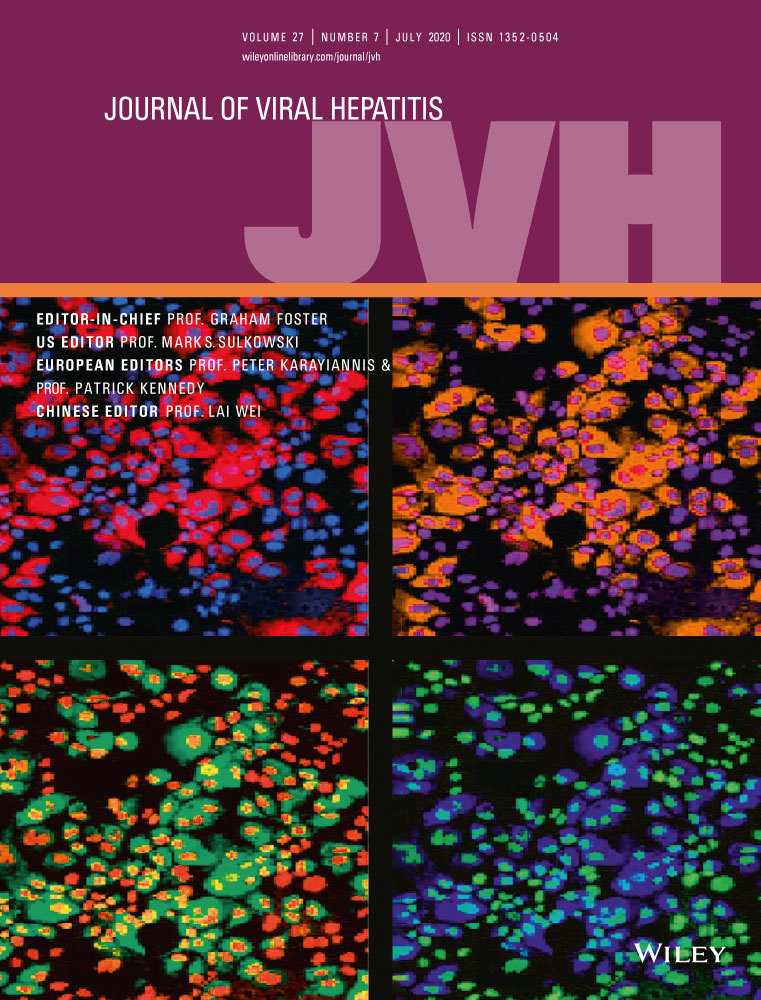Dynamics of liver stiffness by transient elastography in patients with chronic hepatitis C virus infection receiving direct-acting antiviral therapy—Results from the German Hepatitis C-Registry
Abstract
The impact of direct-acting antiviral (DAA) therapies on fibrosis regression remains uncertain. In the current study, we prospectively evaluated dynamics of liver stiffness by transient elastography (TE) in patients with chronic HCV infection receiving DAA-based treatment. Patients (260) were enrolled in the German Hepatitis C-Registry (DHC-R), a national multicentre real-world cohort. Liver stiffness (LS) was assessed at baseline, end of treatment (EOT) and 24 weeks after EOT (FU24) by TE. Biochemical, virological and clinical data were obtained in parallel. In patients with SVR, there was a significant improvement of LS between baseline (median [range], 8.6 [1.7-73.5] kPa) and FU24 (7.9 [1.7-75 kPa]; P < .0001) as well as between EOT (8.4 [1.7-73.5 kPa]) and FU24 [P < .0001]. Stratified by fibrosis stage, patients classified into F4 had higher magnitude of LS reduction between BL (median [range], 25.1 [13.5-73.5] kPa) and FU24 (21.5 [3.1-75] kPa; P = .002) compared to those with F2-F3 (8.9 [7.1-12.4] kPa and 8.8 [4.2-29.1]; P = .060) or F0-F1 (5.3 [1.7-7] kPa and 5.2 [1.7-7.7]; P = .064). In cirrhotic patients, low platelets were significantly associated with lack of liver stiffness improvement, both at EOT (P = .018) and at FU24 (P = .012). LS significantly correlated with ALT (r = .371), AST (r = .552), platelets (r = −.499), GGT (r = .250), bilirubin (r = .230), APRI score (r = .512), FIB-4 score (r = .517) and FORNS index (r = .562); P < .0001. Liver elastography improved significantly in our real-world cohort after DAA-based therapy. As LS correlates similarly with transaminase levels and serum fibrosis markers, it might reflect both reduction of necroinflammation and fibrosis regression.
CONFLICT OF INTEREST
Viola Knop has nothing to disclose. Stefan Mauss presented sponsored lectures (National or International) for Gilead, AbbVie and MSD; and served on advisory committee or review panel for Gilead, AbbVie and MSD. Tobias Goeser has nothing to disclose. Andreas Geier served on the steering committee for Gilead, Intercept and Novartis; is an advisor for AbbVie, Alexion, BMS, Gilead, Intercept, Ipsen, Novartis, Pfizer and Sequana; is a speaker for AbbVie, Alexion, BMS, CSL Behring, Falk, Gilead, Intercept, Merz, Novartis and Sequana; and provided research support for Intercept, Novartis, Kibion, Exalenz, Velux Foundation and Burgerstein. Tim Zimmermann reports personal fees, grants or research support from AbbVie, BMS, Gilead, MSD, Novartis and Roche. Kerstin Herzer received grant support from Astellas, Biotest, Chiesi and Novartis and been a consultant/speaker for AbbVie, Biotest, Bristol-Myers Squibb, Chiesi, Gilead Sciences, Janssen Pharmaceuticals, MSD, Astellas, Novartis and Roche. Nils Postel has nothing to disclose. Mireen Friedrich-Rust received grants from Echosens, Siemens and Hitachi; and served on the advisory board for Toshiba. Wolf Peter Hofmann has nothing to disclose.




